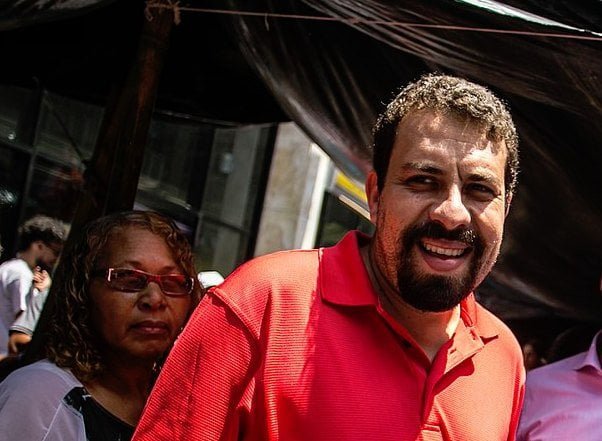From Jacobin
From Anti-Politics to Restoration
The PT’s travails have been widely documented. What appears to be happening is that the party is losing hegemony on the Left. PSOL’s encouraging performance in São Paulo’s mayoral election, with Lula as other leading left-wing figures rallying behind Boulos’s campaign suggests this is so. Antipetismo — formally, hatred of the PT, but really a reheated, hysterical anticommunism combined with a traditional distaste for self-assertion on the part of the poor, black, and working class — may also have been tempered. Antipetismo was dependent on the PT’s incumbency; though the party was thrown out of office in 2016, the wave was strong enough to see the center swing behind Bolsonaro, antipetista-in-chief, in 2018.

It could be that negative sentiment only attaches itself to the PT as a specific party, that antipetismo is no longer a powerful, conservative social force. Indeed, a close Bolsonaro advisor, Filipe Martins, publicly worried that his side had failed: anticommunism had only been narrowly understood as antipetismo, which had let the rest of the Left off the hook. The Left may be less hated now, but it is also weak and fragmented.
Less often noted is how Bolsonarismo also signaled a retreat for PSDB, whose voters abandoned it in 2018. The recent municipal elections seem to back up this claim. For all the talk of a “return to the center,” the two main ideological organizing forces of post-1988 Brazil, the center-left PT and the center-right PSDB, may now be losing their cohering role and centrality.
The Arenão — fragmented and available for rent from any takers in the period between re-democratization and the start of the Lava Jato investigations — reconsolidated as a force from 2015 onward, precisely to defend itself from the anti-corruption campaign.
As evidence of its growing confidence, one of its main constituents, DEM, now holds the presidencies of the Senate and the Chamber of Deputies; earlier this year, its cadre, Luiz Henrique Mandetta, also held the health ministry, until his growing popularity led Bolsonaro to fire him. Mandetta is being talked about as a possible 2022 presidential candidate; DEM never stands presidential candidates.
We are witnessing the ascendance of the old, corrupt, clientelist right at the same time as the massive entry of military figures into civilian government, these two forces now mediated by Bolsonaro and Bolsonarismo. Martins, the aforementioned advisor to the president, recently tweeted that “we can no longer dismiss real, practical, day-to-day politics that happens in neighborhoods, in local newspapers and in the legislative chambers of each municipality.” Anti-politics is out, grubby old conservative politics is in.
If Trump’s defeat and Biden’s victory in the United States represented the restoration of centrist neoliberalism, Brazil’s restoration is of an altogether different variety. It is the old cadres of the military dictatorship and their civilian supporters who are back, but now with Bolsonarista characteristics.
The latter is best understood as, to take the title of a recent book, the “Republic of the Militias”: the empowering of extortion rackets and other organized criminal operations manned by retired and off-duty cops — and their increasing imbrication with the state. Where, from 1964–85, the military and its civilian allies sought to impose order, now they sow chaos.
Brazil’s 1988 Constitution enshrined political mechanisms that kept retrograde local elites in power, preventing the realization of that same Constitution’s many progressive aims. Those contradictions were kept in check for two decades by two factors: the curbing of inflation due to the 1994 Plano Real, administered by the PSDB, and economic growth and mild redistribution in the 2000s, administered by the PT. The growing marginalization of these two parties, whose traditional leaders were at the vanguard of opposition to the dictatorship and for re-democratization, bears witness to Brazilian democracy’s tragic trajectory.
The 1990s and 2000s now increasingly appear as a brief interlude — rather like the period preceding the 1964 coup — when a moderate capitalist democracy achieved supremacy over the retrograde forces that normally superintend capitalist order in the global periphery.
The exit strategies proffered by Arvitzer and Nobre do not make great reading either: collapse into dictatorship, or “managed democracy,” seems plausible — be it with Bolsonaro or without. Should the markets make clear they want the president’s ouster, the Arenão will oblige, with a retired general, Vice President Hamilton Mourão, waiting in the wings.
The alternative is the construction of a broad democratic front to not only push for impeachment, but to institute a new democratic republic — a repeat, in effect, of the movement for democracy in the 1980s. The latter would require the unity of the Left with precisely those the centrist forces who embraced Bolsonaro only two years ago — and who backed the “Temer plan” that accelerated Brazil’s race to the bottom two years before that.
Even should such an alliance materialize, it would be no resumption of the 1994–2016 pattern. Too much has been destroyed — workers’ rights slashed, lawfare institutionalized as a mode of politics to take down political enemies, institutional authority a void, and a brutal spending ceiling inserted into the constitution, whose effect is to constrict institutions that can provide a degree social citizenship, let alone any grand developmentalist plans.
The Left needs to rebuild its base and it needs a program for a new democracy. The good old days aren’t coming back — and they weren’t that good in the first place.
Leave a Reply
You must be logged in to post a comment.